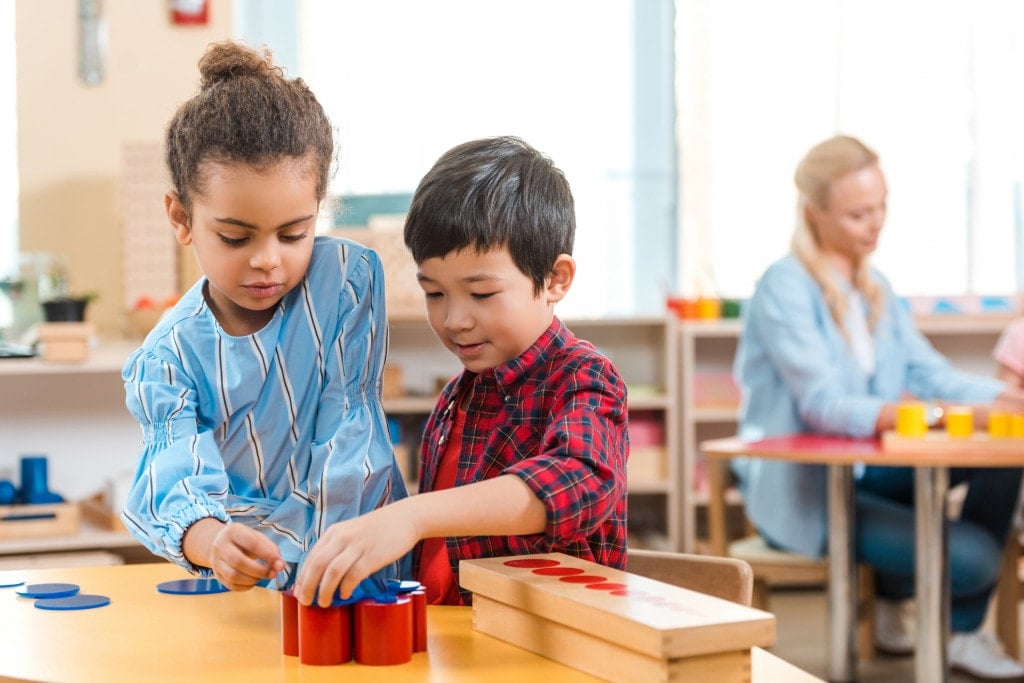Humans are built to socialize; we are meant to exist in groups because they bring us a sense of connection and protection. Social interaction is so critical to our health and well-being that a lack of social skills, isolation, and loneliness can increase our risk of mental and physical health issues.1 Social skills for kids are an essential element of development. While some kids are naturally sociable, many children need to learn certain skills actively and have the opportunity to practice before they get good at them. The process of learning these skills is called socialization.
Despite social skills being integral, children’s socialization is essential because we aren’t necessarily born with all the social skills we will need to navigate the world around us safely (and appropriately). In addition, some skills are complex or become increasingly complicated as we grow up, so learning to socialize can be a lifelong journey.
What Are Social Skills?
The definition of social skills is the tools that someone uses to help them communicate, ask for help, learn, and get their needs met in healthy and appropriate ways. Social skills help kids get along with others, develop healthy relationships, and interact with people in the community around them.2
Why Are Social Skills Important for Kids?
Social skills are incredibly important for kids (and adults alike). Some of the benefits include:3,4
- Higher achievement and success in education
- Better quality, healthy relationships with peers (associated with getting along well with others and being able to problem-solve and resolve conflict)
- More likely to go to college or further education and be employed in a full-time role (in children who were better at sharing, listening, and following the rules — all critical social skills)
- A better predictor of being successful as adults
- Fewer experiences of legal troubles and substance use issues
- Reduced stress (research found that learning a new social skill reduces cortisol, a stress hormone)
11 Types of Social Skills That Kids Can Learn
Social skills examples include verbal and nonverbal communication, such as speech, gestures, posture, body language, and facial expressions. Particular behaviors or interpersonal skills that are important for our children to learn include:
1. Sharing and Turn-Taking
Our little ones can (at times) be a little selfish or egocentric… it’s all me, mine, now! However, learning and being willing to share with their peers or others around them can help children make and keep friends. Sharing and being compassionate also helps kids feel good about themselves, which can boost their self-esteem.4
2. Effective Communication
Effective communication, including listening skills, is vital for kids to learn.5 Children are often less frustrated when communicating their needs, thoughts, and opinions. This means they are less likely to have tantrums or express challenging behaviors that might impact people around them. In addition, communication is about being able to listen well. It means you are hearing what someone says and using that information — whether listening to a teacher or following instructions. Or hearing a friend who is upset and understanding that they need support or a hug. Listening is a crucial building block of empathy.5
3. Empathy
Understanding someone else’s feelings and using that information to influence how you communicate or interact with them is an important social skill.6 Children who understand how their actions might impact others can learn how to change or modify their behavior. This smooths social situations, making them more likely to experience healthy and reciprocal relationships.6
4. Making Eye Contact
It seems automatic, but appropriate eye contact can change a social situation’s dynamic.7 Have you ever told your child, “Look at me when I’m talking to you”? We usually expect a certain level of eye contact to show that the other person has noticed and is paying attention. Equally, too much eye contact can be intense or uncomfortable — knowing when to look away is also an art form our kids need to learn.
5. Adhering To Boundaries
This is about respect and consent, including personal space.8 When our children understand personal boundaries, it helps them create strong and healthy relationships. Some kids like to get right up close and personal or won’t take no for an answer. This can make people feel uncomfortable or upset. So, it’s important to help them understand and respect others’ boundaries.
6. Using Manners
Having good manners can improve social interactions. By learning to say “please” and “thank you” and asking in polite, appropriate ways, people tend to be happier or more agreeable to the request. Or they are likely to help with future requests.
7. Following Directions
Our kids must learn how to listen carefully so they fully understand instructions. They also need the skills (cognitive and emotional) to follow through with the request. Following directions can keep kids safe (don’t touch the hot kettle) or support them in achieving (complete your homework at school). Kids who don’t follow directions may experience negative outcomes or consequences if they can’t — or won’t — follow directions and instructions.
8. Cooperation
This is the process of working together to achieve a joint goal. Cooperation is an important skill in the community, school, and adulthood. It means showing respect when others make a request and contributing and helping others. This requires kids to show respect, understand their role within a group, have good communication skills, and put group needs before their own.9
9. Patience
Being able to wait or have self-control is an important skill. Our children can’t possibly get their way every time, nor will they always be able to get what they want when they want it. They need to learn to wait. Kids who develop patience grow into adults who experience better health and well-being, stronger relationships, and achievements or success.10
10. Positivity
Having a positive mindset is vital for good mental health and well-being. This can also mean that being around a child who sees the positive or looks for opportunities rather than challenges or negatives can be more enjoyable or support positive social interactions.11
11. Problem-Solving
Social problem-solving is an important skill. Children must learn how to analyze, understand, and choose an appropriate response to social problems or conflict.
How To Teach Social Skills to Kids
While some children are naturally more comfortable in social situations, it’s essential to understand how to improve social skills, as they can also be taught (not just innate or part of our temperament). Teaching social skills involves several strategies, including:
- Modeling: It’s essential to demonstrate your own positive social skills to your children so they can see how it’s done. Do you want them to use their manners? Well, you need to use yours and set the expectation based on your actions.
- Role play: Activities for teaching social skills often involve an element of practice. So, help your child play out or practice scenarios to help them build their social skills. This could mean imagining how they would react or say on their first day of school if they are worried about making new friends. Or practicing turn-taking.
- Worksheets: Social skills worksheets for kids can be helpful prompts or opportunities to reflect on their social skills. For example, you could write down some social situations and have them record or map out how they might respond. Or, if there are particular skills they are working on, you could create posters with tips or reminders for the skills and strategies they need to practice or try. These social skills activities might be more suited for preschoolers or those who can read, but using lots of visuals or pictures could work for children who can’t read.
- Games: This is probably something you do already. When you play a game, you are practicing turn-taking and patience. Kids also can model or practice how to win and lose graciously.
- Songs or books: Read books with themes about sharing, social situations, or different emotions and ways to cope. We can fill their knowledge base and get them thinking about different social skills before exposure to these situations. And it’s a non-threatening way of addressing tricky topics like bullying.
How Can You Tell if Your Child Has Problems With Social Skills?
Remembering that social skills develop over time and with practice is important. So, small children and toddlers might not be very good at navigating groups or cooperating. But it’s important to monitor and see that they are progressing and can learn and apply the information you teach. It’s also important to understand what is age-appropriate or developmentally appropriate and see if your child falls outside these expectations. Some kids may need a little reinforcement, but difficulties with social skills can be a sign of other problems or a specific diagnosis, like attention deficit hyperactivity disorder (ADHD), autism, hearing loss, anxiety, depression, and more.12,13,14
If your child struggles with social skills more than others their age, it’s important to explore this with your healthcare provider. Remember that social skills can be taught, even for children experiencing other concerns. So, start small and build their skills up over time.

























